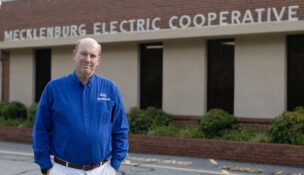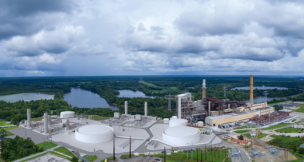Charging ahead
Dominion Energy encourages electric vehicle adoption
Charging ahead
Dominion Energy encourages electric vehicle adoption
Greener rides are on tap for schoolchildren and commuters as Dominion Energy Inc. accelerates efforts to increase the number of electric vehicles on Virginia roads.
Electric transportation is a key component of the Richmond-based utility’s 10-year Grid Transformation Plan, which sets targets for reducing carbon, adding renewable energy sources and transforming the electric grid for greater reliability. The utility announced the plan in 2018 in response to the General Assembly’s Grid Transformation & Security Act, which outlines Virginia’s energy future.
Additionally, as part of Virginia’s Clean Economy Act passed in 2020, Dominion is working to achieve net zero carbon dioxide and methane emissions by 2050. The utility plans to add 24 gigawatts of renewable energy during the next 15 years, including 16.1 gigawatts of solar and onshore wind, 5.2 gigawatts of offshore wind and
2.7 gigawatts of battery storage by 2035.
With transportation producing most carbon emissions in Virginia and the nation, Dominion officials say electric vehicles can significantly enhance the environment. “Our electric transportation initiatives focus on lowering the carbon footprint of the company and helping our customers do the same,” says Kate Staples, Dominion’s manager of electrification. “We know electric transportation benefits our customers and the communities we serve.”
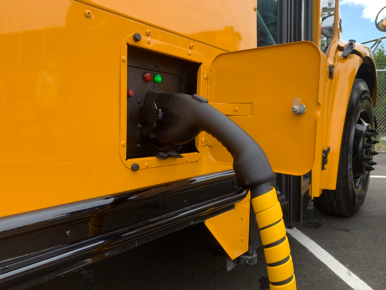
subsidizing 15 Virginia school districts’ purchases of electric buses, which cost more than three times the price of a diesel-powered bus. Photo courtesy Dominion Energy Inc.
Generating few to no emissions, electric vehicles improve air quality and reduce carbon emissions while costing less to operate and maintain than gas-powered vehicles. According to the Edison Electric Institute, electric vehicles discharge 54% fewer carbon dioxide emissions, and motorists spend 50% less on fuel. “If electric vehicles are integrated with the grid prudently, we can help minimize the impacts of their charging and maximize the benefits of electric vehicle transportation,” Staples adds.
Dominion is counting on its deployment of the nation’s largest electric school bus fleet to enhance its power grid while reducing emissions and improving air quality aboard buses. Although delayed by COVID-19 and the pandemic’s adjustments to school schedules, the first electric buses were delivered to Virginia school districts in fall 2020. Fifteen districts — Augusta, Charles City, Chesterfield, Fairfax, James City, Loudoun, Louisa, Middlesex, Pittsylvania and Prince William counties as well as Alexandria, Chesapeake, Hampton, Virginia Beach and Waynesboro — are participating in the Dominion Energy Electric School Bus Program. More than 30 districts, requesting some 200 electric buses, applied for the pilot program, which launched in October 2020.
“We picked an interesting year to launch the nation’s largest electric school bus program,” Staples says.
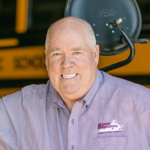
Fifty electric school buses were rolled out to local school systems by the end of 2020, with more buses slated for delivery early this year.
Power trips
An electric school bus costs about $325,000, compared with approximately $100,000 for a traditional diesel-powered bus. The higher price tag comes from the new technology built into electric buses, including the electric motor, the battery energy storage system, the ability to integrate with the grid and a braking system that can recharge the battery. The school districts in the Dominion program purchase electric buses at the same price as diesel models, with Dominion offsetting the difference. Dominion owns the battery and picks up the tab for charging stations and related equipment. The program does not result in additional costs to customers, with expenses for the first phase covered by Dominion’s base rate.
“With any new technology, change can be scary, but we were pleasantly surprised by the interest expressed,” Staples says. “We’d love to have all buses on the road in Virginia be electric, but we’re taking a staged approach and working with school districts based on their needs. We definitely have school districts that have asked how to get more electric buses.”
School districts were chosen based on “where the school is, the level of demand, number of customers, customer demands and if renewable energy is on the circuit,” Staples says. Districts also requested specific amenities for the buses, such as air conditioning, onboard cameras, an outside camera and Wi-Fi. Seatbelts will be on all buses, a Dominion requirement.
For phase one of the program, Dominion partnered with Lynchburg bus dealer Sonny Merryman Inc., North Carolina-based bus manufacturer Thomas Built Buses Inc. and California-based electric bus designer Protera.
“Looking at the bus from the outside, you can’t tell a difference,” says Sonny Merryman President and CEO Floyd Merryman. “You wouldn’t know it’s different until you open the hood. There’s no engine, and the battery is under the frame.”
The emission-free Saf-T-Liner C2 Jouley electric school buses are 60% less expensive to operate than diesel-powered buses. Replacing one diesel bus with an electric version is the annual equivalent of removing 5.2 cars from the road and reducing greenhouse gas emissions by 54,000 pounds, according to Dominion. There also is less maintenance since electric buses have fewer parts and do not require oil changes.
Each bus can travel approximately 135 miles on a single battery charge. “A 135-mile range is plenty for a school bus,” Staples says, noting that a typical bus route runs 30 to 40 miles twice a day. The buses can be fully charged in three to four hours.
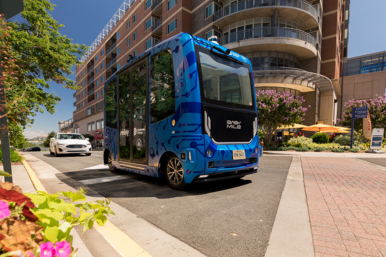
Additionally, the buses can be used as portable batteries through vehicle-to-grid technology, storing and transferring energy to Dominion’s grid during high demand periods when the buses are not needed to transport students. Buses also could be used as mobile power stations during emergencies or power outages. Batteries last for the 15-year life of the bus. After that, Dominion plans to continue using the vehicles’ batteries to support the electric grid.
Pending General Assembly approval for phase two of the program, Dominion expects to replace 200 diesel buses with electric buses each year for the next five years. Batteries from 1,000 buses could provide enough energy to power more than 10,000 homes. In phase three of the program, 50% of all diesel school buses will be replaced with electric models by 2025 and 100% by 2030. Dominion is encouraging districts to get the usable life out of their diesel buses before replacing them with electric models.
“The Dominion program is one of a kind,” Merryman says. “Other utilities around the U.S. are looking at this very closely to see if Dominion will be successful getting legislative approval for the plan.”
Test drive
Meanwhile, Northern Virginia passengers can get a free ride between the Dunn Loring Metro station and the Mosaic District in Fairfax County aboard the autonomous electric EZ10 shuttle. The pilot project is a public-private partnership between Dominion, Fairfax County, the Virginia Department of Rail and Public Transportation, the Virginia Department of Transportation, the Virginia Tech Transportation Institute, George Mason University and Washington, D.C.-based developer Edens. The rail and public transportation department provided a $200,000 grant, while Fairfax County kicked in $50,000 to operate the program. The shuttle is operated by Transdev North America, which has run autonomous vehicles in California, Colorado and Florida.
“Fairfax County has had a longstanding interest in electric vehicles,” says Dan Storck, Mount Vernon district supervisor on the county’s Board of Supervisors. “It really accelerated over the

last couple of years. We see the challenge we all face with global warming and the need to reduce carbon emissions and increase the numbers and types of carbon reduction initiatives.”
The 13-foot, zero-emission shuttle, nicknamed Relay, debuted in October 2020 in the county’s Mosaic District. Owned by Dominion, the connected autonomous vehicle travels a 1-mile route in regular traffic lanes at about 10 mph. “People have embraced it very thoroughly,” Storck says. “It enables people to go from the Metro station to the Mosaic District easily and is one way of making sure that community continues to thrive and is a modern place where young people want to go.”
Relay runs frequently during the daytime although it seats only four passengers, including a safety steward who can take control of the vehicle if necessary. The vehicle includes sensors and GPS that spot hazards, with Relay responding by slowing or stopping.
“Ultimately, we are looking for it to be viable long term,” Storck says. “The first hurdle is to prove it can run autonomously.”
While it isn’t going driverless, Hampton Roads Transit has also made a foray into renewable energy, rolling out six electric buses late last year. Acquired through a partnership with Dominion, the buses were deployed on one of Hampton Roads Transit’s busiest routes between the transit center in Norfolk and the Virginia Beach Oceanfront. Drivers and mechanics were trained in operating the electric buses, each of which underwent a 500-mile test before passengers were allowed onboard.
“It’s a demonstration project to test the abilities and feasibilities of the buses to make sure all-electric buses meet our needs,” says Jim Price, Hampton Roads Transit’s chief operating officer. Testing will last at least two years, but the company anticipates using the buses for about a dozen years, along with additional electric models. “We would select another route or two that would be good candidates for all electric buses and expand in a controlled environment.”
The zero-emission, all-electric buses, the first for Virginia public transit, each cost approximately $1 million, about twice the amount of a diesel bus. The project is supported by state and federal grants, as well as the Volkswagen Environmental Mitigation Trust.
Sparking change
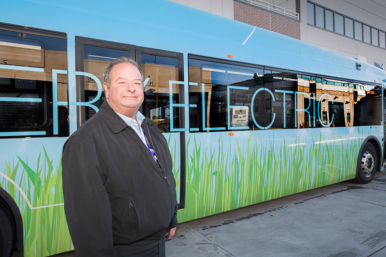
Along with public forms of transportation, Dominion is encouraging its customers to switch to electric vehicles for personal use. With about 20,000 electric vehicles currently on the road, Virginia ranks 15th in the U.S. for electric vehicle use, but Dominion anticipates there will be 170,000 electric vehicles in the state by 2030. “All of those vehicles will need to charge,” Staples notes. “That requires more infrastructure. If we can encourage drivers to charge their vehicles when the infrastructure is not strained, we might not have to put in as much infrastructure. That benefits all of our customers.”
Those benefits include rebates that Dominion recently introduced for qualifying electric vehicle charging stations in multifamily communities, workplaces, transit bus depots and fast-charging locations through the utility’s Smart Charging Infrastructure Pilot Program. Approved by the State Corporation Commission, rebates for infrastructure, chargers and network fees range from $2,000 to more than $50,000 per project.
A rebate program to be launched this year will offer incentives for electric vehicle owners to charge their vehicles during off-peak times. “Charging electric vehicles uses energy from the grid,” Staples notes. “It’s more beneficial to use energy at certain times of the day, so we’re using smart technology incentives to encourage customers to charge their vehicles when the strain on the grid is not so high. If their car is parked, most folks don’t care when it’s charging as long as it is charged when they need it.”
Dominion also is installing four public, fast-charging stations in Northern Virginia as part of its rideshare electrification initiative. Currently, there are 701 public charging stations across Virginia, including 118 fast charging sites that can charge an electric vehicle battery to 80% in less than 30 minutes.
In addition, Dominion is transitioning one-quarter of its light duty fleet to electric vehicles and is installing charging stations at its offices and offering incentives to employees who purchase an electric vehicle.
“Once folks drive electric vehicles, they really love them,” Staples says. “They’re very quiet, very efficient and very fun to drive.”
>










